Education secretary takes 'full responsibility' for qualifications system
- Published
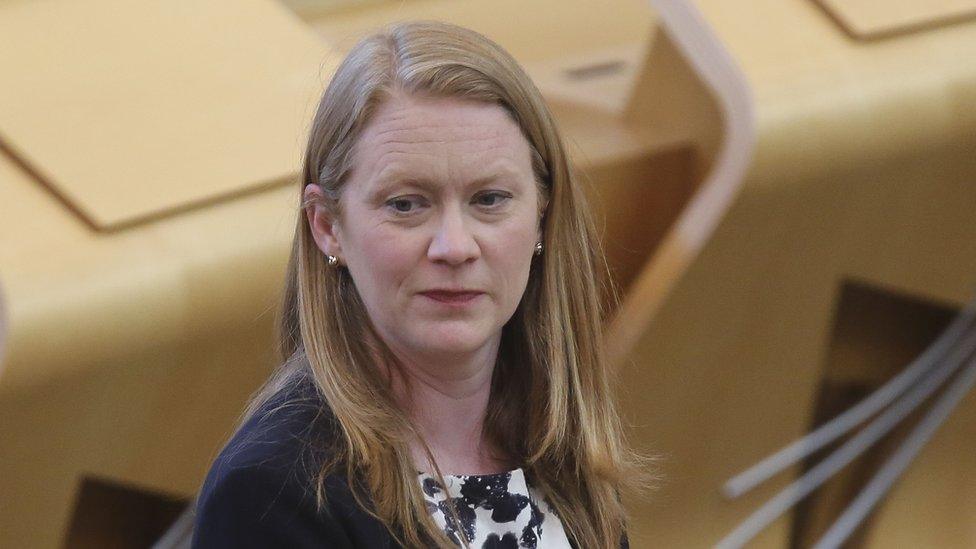
New Education Secretary Shirley-Anne Somerville took over the role from John Swinney
The new education secretary has said she will take "absolute responsibility" for Scotland's qualifications system.
Shirley-Anne Somerville promised she would not blame anyone else if there were any issues with the awards.
She said Scotland had a fair, credible and a consistent assessment policy despite criticism of the Scottish Qualification Authority (SQA).
The Scottish Greens have tabled an amendment at Holyrood expressing "lack of confidence" in the SQA.
The Scottish government announced its overdue appeals process for Higher and National 5 candidates on Wednesday, amid widespread criticism from pupils, parents and teachers.
An alternative qualifications model has been introduced after exams were formal exams were cancelled for a second year running due to the Covid pandemic.
Grades are to be awarded on the basis of "teacher judgement of evidence of learner attainment".
Senior pupils faced numerous assessments throughout May to provide evidence for awards.
But the system came under attack after many students and parents claimed these assessments were "exams by another name," conducted with less preparation and often in a more intensive time period.
They said the assessments were causing more stress and anxiety than the usual exam system.
On Wednesday, more than a month later than originally planned, Ms Somerville finally outlined controversial details of the appeals process - which she said could see pupils having their grades revised down as well as up.
Speaking on the BBC's Good Morning Scotland programme, the education secretary said she had confidence in the arrangements that had been made for this year.
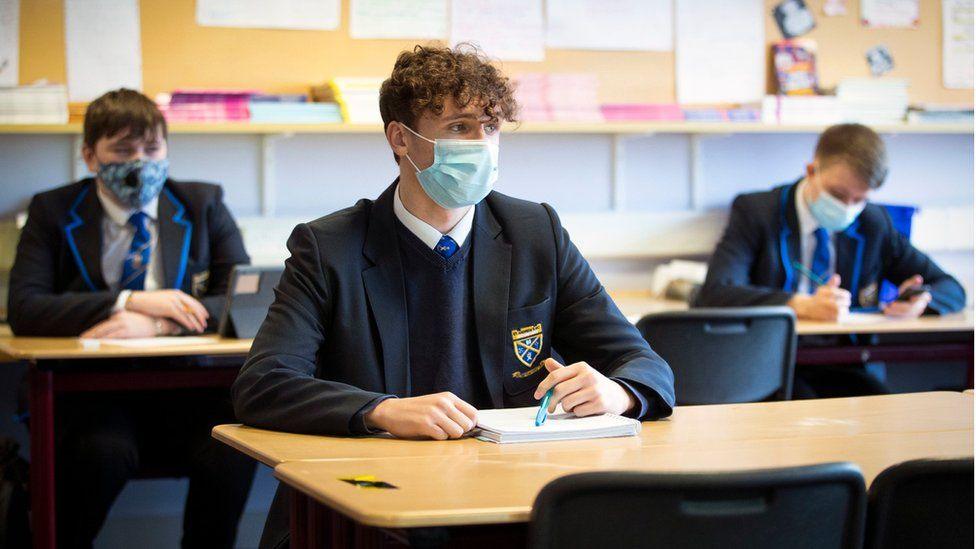
There was no formal Scottish exam diet in 2020 or 2021
She added: "Of course I will take absolute responsibility. That is part of becoming education secretary, it is my responsibility to listen to the stakeholders and make the decisions. I won't pass the buck onto anyone.
"I will ensure as we go through this process, I listen to young people, teachers educationalists and to parents to make sure we design the fairest most consistent and credible policy, and I think we have done that."
Ms Somerville said the "the fair, credible and a consistent assessment policy" was not devised by the government alone, but by the National Qualifications 2021 group that she said included young people, trade unions, parents and other educationalists.
'Let down and ignored'
But the only young person on the group - Cameron Garrett, who serves as a member of the Scottish Youth Parliament - has strongly criticised the new appeals process.
He claimed the voices of young people had not been listened to, and said they had been "let down and ignored by this process".
He added: "Young people deserve fairness this year and should be able to have confidence in the system. Neither is currently true."


Is there an exams crisis? It depends who you ask.
I've been following this story closely for months and so far the vast majority of young people I have spoken to are not happy with the process. They say they were told there would be no exams, only to find themselves studying for tests which looked and felt exactly like exams but, for many, without the study leave.
Teachers' representatives involved in creating the way qualifications work this year - the EIS union and School Leaders Scotland - say this is the best solution and the fairest way to measure pupils' abilities. The teachers' groups not involved in the process - the SSTA and NASUWT - say it's flawed and not allowing them to exercise real judgement.
Like young people, the vast majority of parents I speak to are also unhappy with how things are panning out. That's backed up by the largest independent parents group, Connect, which is calling for the system to be changed.
The SQA and the Scottish government have both said they do not expect a situation like last year, where a U-turn had to be made after results were given which meant they reverted only to teacher judgement.
Ultimately, we are going to have to wait and see what happens when pupils are told their results.
Are they what they would have expected? Have they been disadvantaged by circumstances outwith their control? And has the system stepped up to help them make up for the disruption they have faced?

Ms Somerville said she recognised that young people had wanted some things to be done differently, but that there had been "no genuine consensus and I have looked to ensure we have a very credible policy as we go through this."
Pupils will receive provisional grades from 24 June. After that, they can speak to teachers and register their intention to appeal if they wish to.
Ms Somerville said: "You absolutely have the right to appeal and for the first time this year young people have the right to appeal directly and at no cost.
"The appeals process has no algorithm involved, it goes to a second teacher outside the school, an SQA appointee. They look at all the evidence and take a decision based on that."
However, opposition parties have criticised the decision to allow grades to be downgraded if a student does appeal, calling it a "perverse gamble".
Ms Somerville said there was a very low incidence of grades being downgraded, and that in 2019 just one candidate's grade in 11,138 appeals was adjusted down.
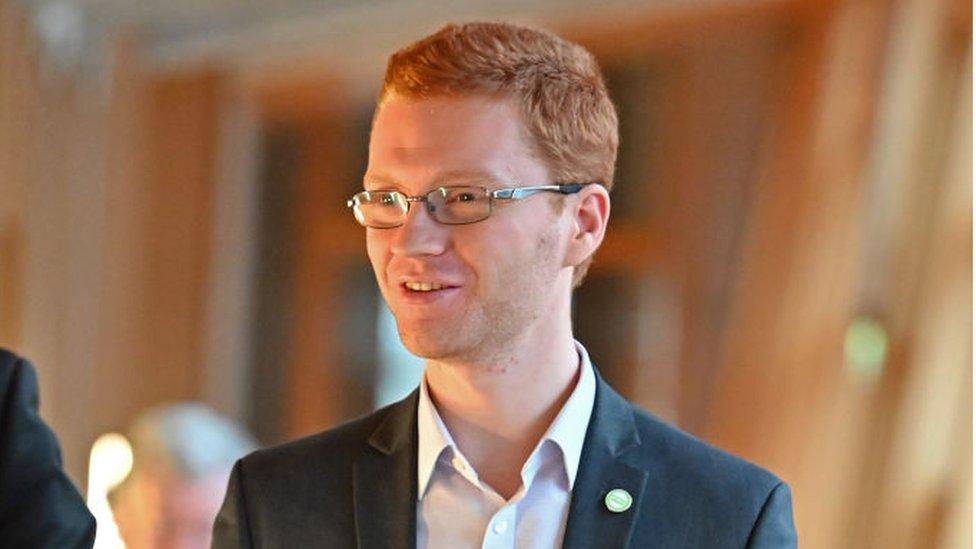
Ross Greer has put forward an amendment which questions the SQA's ability "to fulfil its duties"
The issue was raised at First Minister's Questions in the Scottish Parliament later on Thursday, with Nicola Sturgeon insisting she had full confidence in the SQA while admitting that the system that had been drawn up was "not perfect".
Scottish Conservative leader Douglas Ross described it as the "same old shambles" in education, and said lessons had not been learned from last year despite Mr Swinney being replaced as education secretary.
He called on Ms Sturgeon to accept that the qualifications process was "fundamentally flawed" and said she should move on to address the deeper problems in education - "starting by replacing the SQA".
Scottish Green MSP Ross Greer's amendment in Thursday's education debate acknowledges "additional stress and anxiety felt by students, teachers, parents and carers as a result of the 2021 alternative certification model".
And it says this year's model should adopt a no-detriment policy - meaning grades cannot be lowered - and that provision should be made for appeals based on exceptional individual circumstances.
It goes on to note the "repeated underperformance of the SQA and expresses lack of confidence the body's ability to fulfil its duties".
MSPs previously voted on the performance of the SQA in February, when they backed a motion saying the exam body and schools' watchdog were not "fit for purpose" after the government was forced to u-turn and upgrade the results of tens of thousands of pupils after an outcry over how the grades had been awarded.


- Published2 June 2021
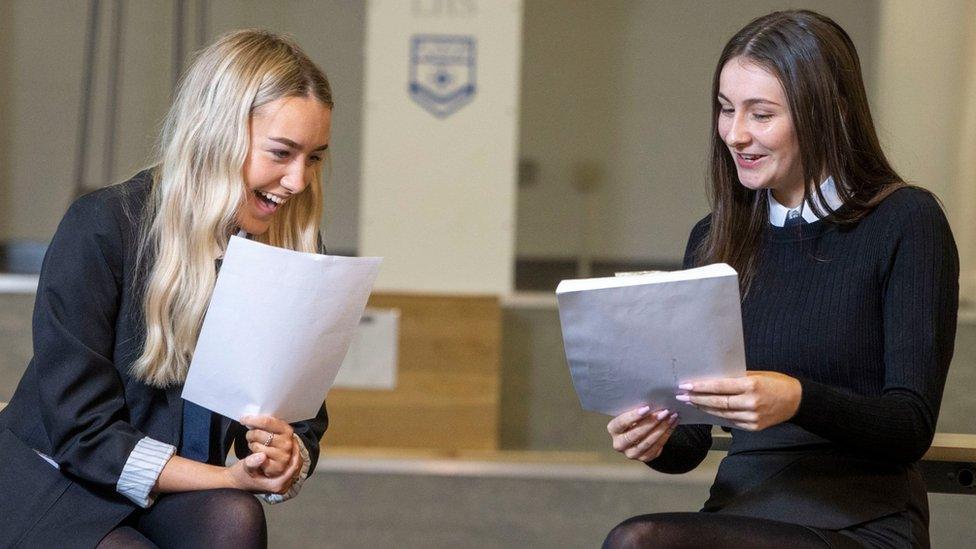
- Published1 June 2021
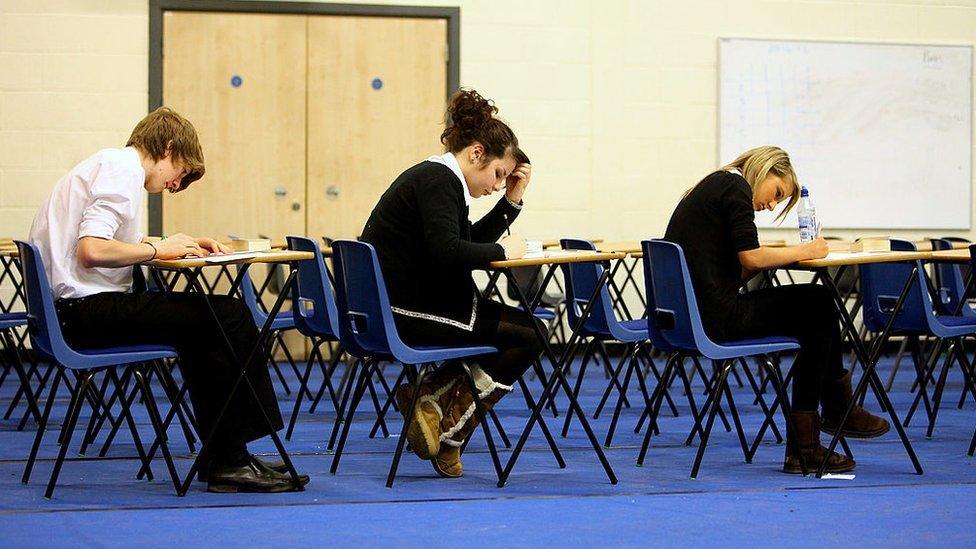
- Published24 May 2021
